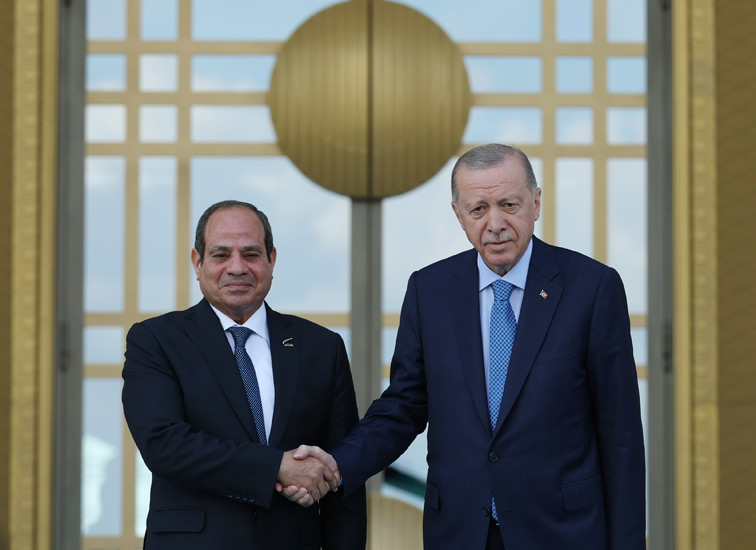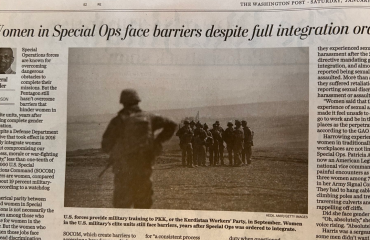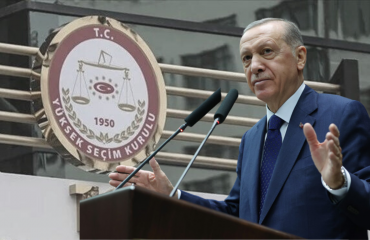

Egyptian President el-Sisi’s visit to Türkiye is the last example of Ankara’s sharp u-turns in foreign policy but definitely not the last one. The president is in Türkiye after 12 years as the two leaders reconciled in 2022 by Emir of Qatar Sheikh Tamim in Egypt.
Egyptian President Abdel Fattah el-Sisi’s visit to Türkiye is significant in terms of Türkiye re-establishing relations with Arab administrations, with which it had almost severed ties during the Arab Spring. It is also the latest example of sharp turns in ruling Justice and Development Party (AKP) foreign policy.
Turkish President Recep Tayyip Erdoğan, who hosted Sisi today, visited Sisi in Cairo last February. He had been calling him “coup plotter” and “murderer” until the Emir of Qatar reconciled them in 2022. Cutting ties with Egypt out of anger towards Sisi was a mistake and cost Türkiye.
Previously, in 2018, Erdoğan had visited Saudi Crown Prince Mohammed bin Salman, whom he had accused of ordering the murder of Jamal Khashoggi in Istanbul, and then bin Salman visited Türkiye.
Similarly, he reconciled with United Arab Emirates President Mohammed bin Zayed, whom he had accused of supporting the Fethullahist coup attempt on July 15, 2016.
It’s no coincidence that these sharp maneuvers occurred in 2022 when Erdogan admitted that his “heterodox” economic policy, summarized as “Let’s lower the interest rate, inflation will fall,” had run aground.
Sisi is the latest example of these maneuvers, but he won’t be the last. Syrian President Bashar al-Assad is next in line.
Why are these news items hidden?
We had learned weeks ago from Cairo sources that the Egyptian President would come to Türkiye on September 4. Thankfully, the Ministry of Foreign Affairs didn’t leave the media in the dark with information notes on Türkiye-Egypt relations, but the Presidential Communications Directorate’s confirmation was dated September 3.
We’re also learning from Moscow sources that a quadrilateral meeting might be held with Syria, perhaps with Iran’s participation. When asked, Foreign Ministry sources say that Russia’s reconciliation efforts are “positively” received in Ankara.
We’ll get to the likely agreement ground with Syria in a moment, but let’s continue with this issue of getting news that concerns us from others.
For example, we had learned from Washington sources about the joint exercise of Türkiye’s sole amphibious assault ship TCG Anadolu with the USS Wasp, an amphibious landing ship sent by the US to the Eastern Mediterranean to “reinforce Israel’s security”. The Ministry of National Defense confirmed it as a “joint training exercise” after criticism.
As the Wasp is still anchored in Izmir; American soldier was attacked in İzmir framed as a protest, but there are other protests in the city every day.
Why do we first learn about these important news items from foreign sources? What is there to hide?
Sharp vinegar damages its own jar
Perhaps Ankara has adopted a new communication tactic to prevent questioning of these sharp turns in foreign policy – which I think are in a positive direction? Those who think Ankara is doing this just to keep attention focused on “Israel-centric diplomacy” are also mistaken. In my opinion, Erdoğan wants to keep a low profile while taking steps that won’t conflict with the US system – except for Israel – until the new US President is determined in the November 5, 2024 elections.
We see an example of this in the case of the BRICS meetings as well.
The news that Erdoğan was invited to and accepted the invitation to the BRICS Summit to be held in Kazan, the capital of Russia’s Federal Republic of Tatarstan, on October 22-24, also came from Moscow. Foreign Ministry sources say they have no information and that no information has been shared with them. Is it the Russian Ministry of Foreign Affairs or the Turkish Presidency that’s not sharing information? As of the morning of September 4, there was still no confirmation or denial from the Presidential Palace.
Türkiye lost out due to Erdoğan’s Middle East policy from 2011 to 2021. With the Libya Crisis, Türkiye showed that no game could be set up in the Eastern Mediterranean by excluding Ankara but if relations with Egypt had not been cut off, perhaps all these difficulties would not have been experienced.
Egypt, Israel, Palestine
Türkiye didn’t lose out in the 2019-2021 Libya Crisis, but Egypt, which sided with Russia, France, UAE, and Greece against Türkiye in Libya, came out the most profitable; it established the largest natural gas liquefaction (LNG) facility in the Mediterranean with investments from UAE and Qatar.
Egypt and Qatar are playing the main mediator role between Israel and Hamas in the Gaza Crisis. Türkiye’s contribution is currently limited to having open channels of communication with Hamas and Iran. Erdogan invited Palestinian President Mahmoud Abbas, whom he had once sidelined against Hamas, to speak in Ankara, in the Grand National Assembly of Türkiye. The Foreign Ministry hopes this move will yield results.
Erdogan had actually shaken hands with Israeli Prime Minister Benjamin Netanyahu in New York two weeks before the Gaza Crisis erupted; there was a definite turn there too. If Hamas hadn’t attacked Israel on October 7 and Israel hadn’t started raining fire on Gaza, Energy Minister Alparslan Bayraktar would have gone to Israel that week to sign strategic energy agreements. When the aggression of the Netanyahu government ends, that door may open again.
Syria, Iraq, Iran
Moscow is trying to persuade Assad to give up the condition of complete withdrawal of Turkish soldiers from Syrian territory to talk with Erdogan, and to persuade Erdogan to put on paper the conditions under which he will withdraw soldiers from Syrian territory.
The ground for agreement in Syria is moving towards the Adana Memorandum signed in October 1998, during Süleyman Demirel’s Presidency and Bülent Ecevit’s Prime Ministry, before the AKP was even founded, with the pressure applied to Damascus that led to the expulsion of PKK leader Abdullah Öcalan from Syria. Let’s not forget that in the process of expelling Öcalan from Syria, which led to his capture in 1999, Türkiye received the most serious support from Egypt and Iran.
As for Iraq, the ink had barely dried on the counter-terrorism agreement signed in Ankara on August 16 after long negotiations between Iraq and Türkiye and Erdogan’s visit to Baghdad when a Turkish armed drone was shot down near Kirkuk. News came that the Iraqi brigadier general who said “We shot it down” was later detained and that the missile that shot it down was a French-made missile fired from a nearby US-French base. It seems there’s no room for sharp turns in Iraqi politics.
The US invasion included Iran in the Iraqi administration. Just as an equation cannot be established in the Eastern Mediterranean without Türkiye, an equation cannot be established in Syria and Iraq without Iran anymore.


